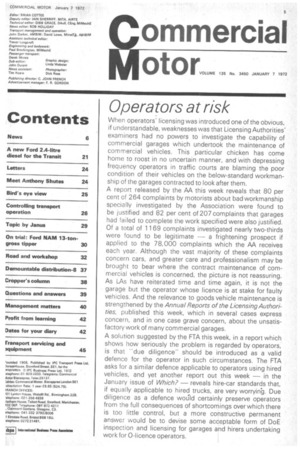Operators at risk
Page 7

If you've noticed an error in this article please click here to report it so we can fix it.
When operators' licensing was introduced one of the obvious, if understandable, weaknesses was that LicensingAuthorities` examiners had no powers to investigate the capability of commercial garages which undertook the maintenance of commercial vehicles. This particular chicken has come home to roost in no uncertain manner, and with depressing frequency operators in traffic courts are blaming the poor condition of their vehicles on the below-standard workmanship of the garages contracted to look after them.
A report released by the AA this week reveals that 80 per cent of 264 complaints by motorists about bad workmanship specially investigated by the Association were found to be justified and 82 per cent of 207 complaints that garages had failed to complete the work specified were also justified. Of a total of 1169 complaints investigated nearly two-thirds were found to be legitimate — a frightening prospect if applied to the 78,000 complaints which the AA receives each year. Although the vast majority of these complaints concern cars, and greater care and professionalism may be brought to bear where the contract maintenance of commercial vehicles is concerned, the picture is not reassuring. As LAs have reiterated time and time again, it is not the garage but the operator whose licence is at stake for faulty vehicles. And the relevance to goods vehicle maintenance is strengthened by the Annual Reports of the Licensing Authorities, published this week, which in several cases express concern, and in one case grave concern, about the unsatisfactory work of many commercial garages.
A solution suggested by the FTA this week, in a report which shows how seriously the problem is regarded by operators, is that "due diligence" should be introduced as a valid defence for the operator in such circumstances. The FTA asks for a similar defence applicable to operators using hired vehicles, and yet another report out this week — in the January issue of Which? — reveals hire-car standards that, if equally applicable to hired trucks, are very worryin`g. Due diligence as a defence would certainly preserve operators from the full consequences of shortcomings over which there is too little control, but a more constructive permanent answer would be to devise some acceptable form of DoE inspection and licensing for garages and hirers undertaking work for 0-licence operators.




















































































